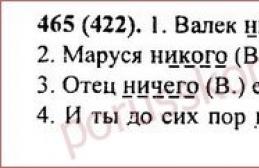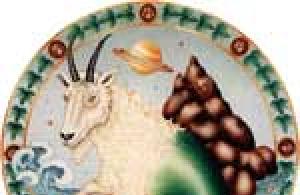You should only be offended when they want to offend you. If they don’t want to, and the reason for the offense is an accident, then why be offended?
Without getting angry, clear up the misunderstanding - that’s all.
Well, what if they want to offend? Before responding to an insult with an insult, it is worth thinking: should one stoop to being offended? After all, resentment usually lies somewhere low and you should bend down to it in order to pick it up.
If you still decide to be offended, then first perform some mathematical operation - subtraction, division, etc. Let's say you were insulted for something for which you were only partly to blame. Subtract from your feelings of resentment everything that does not apply to you. Let’s say that you were offended for noble reasons - divide your feelings into the noble motives that caused the offensive remark, etc. Having performed some necessary mathematical operation in your mind, you will be able to respond to the insult with greater dignity, which will be the more noble the less than value you give offense. Up to certain limits, of course.
In general, excessive touchiness is a sign of a lack of intelligence or some kind of complex. Be smart.
There is a good English rule: be offended only when you want offend intentionally offended. There is no need to be offended by simple inattention or forgetfulness (sometimes characteristic of a given person due to age or some psychological shortcomings). On the contrary, show special care to such a “forgetful” person - it will be beautiful and noble.
This is if they “offend” you, but what to do when you yourself can offend someone else? You need to be especially careful when dealing with touchy people. Touchiness is a very painful character trait.
Letter ten honor true and false
I don't like definitions and am often not ready for them. But I can point out some differences between conscience and honor.
There is one significant difference between conscience and honor. Conscience always comes from the depths of the soul, and by conscience one is purified to one degree or another. Conscience is gnawing. Conscience is never false. It can be muted or too exaggerated (extremely rare). But ideas about honor can be completely false, and these false ideas cause enormous damage to society. I mean what is called “uniform honor.” We have lost such a phenomenon, unusual for our society, as the concept of noble honor, but the “honor of the uniform” remains a heavy burden. It was as if the man had died, and only the uniform remained, from which the orders had been removed. And inside which a conscientious heart no longer beats.
“The honor of the uniform” forces managers to defend false or flawed projects, insist on the continuation of obviously unsuccessful construction projects, fight with societies protecting monuments (“our construction is more important”), etc. Many examples of such defense of “uniform honor” can be given.
True honor is always in accordance with conscience. False honor is a mirage in the desert, in the moral desert of the human (or rather, “bureaucratic”) soul.
Letter eleven about careerism
A person develops from the first day of his birth. He is focused on the future. He learns, learns to set new tasks for himself, without even realizing it. And how quickly he masters his position in life. He already knows how to hold a spoon and pronounce the first words.
Then, as a boy and a young man, he also studies.
And the time has come to apply your knowledge and achieve what you strived for. Maturity. We must live in the present...
But the acceleration continues, and now, instead of studying, the time comes for many to master their situation in life. The movement proceeds by inertia. A person is always striving towards the future, and the future is no longer in real knowledge, not in mastering skills, but in placing oneself in an advantageous position. The content, the real content, is lost. The present time does not come, there is still an empty aspiration to the future. This is careerism. Internal anxiety that makes a person personally unhappy and unbearable for others.
What is honor? This is the indicator by which society evaluates a person’s moral worth; it is our internal judge and limiter, associated with the assessment and perception of such qualities as nobility, chastity, morality, valor, honesty, conscientiousness and much more. Objectively speaking, in a world of sins and temptations, it is difficult to be a man of honor - it is much easier for them to appear and pretend to be such, and this fact leads us to a discussion about what is true honor in this case, and what is imaginary?
In Russian literature there are many examples of virtues, people who are honest and correct in relation to their thoughts and actions, no less than those whose activities are thoroughly saturated with hypocrisy and falsehood. Imaginary honor is the prerogative of weak and empty individuals who do not know how or do not want to live their own lives, but only pretend to be completely different individuals. Moreover, such people often have a pronounced complete dissonance of thoughts and actions. The main indicator of imaginary honor is dishonesty, while in the case of true honor, conscience comes first. For those who only pretend an honest man, there is a complete lack of self-respect, and honest people, on the contrary, are primarily guided only by their own worldview and worldview, honesty and justice in relation to themselves and to others.
A good example of a man of honor is Pyotr Grinev, the hero of the story by A.S. Pushkin " Captain's daughter" We get acquainted with his activities at an age when a person’s character is a priori not fully formed - however, already being very young, Peter, with absolutely good intentions, thanks the traveler for his help, giving him his sheepskin coat. As the story progresses, we become more and more convinced of the integrity of this hero: he fights for the honor of his beloved in a duel with Shvabrin, well aware of the risk to his own life, but immediately forgives the scoundrel who slandered Maria, realizing that no physical punishment can teach the scoundrel a lesson and instill in him respect for people, which means that no such punishment makes sense. And even own life for Peter there is no competition with self-esteem, and therefore when Pugachev gives the hero a choice: to die or go over to the side of the enemy, Grinev without a doubt chooses death. Yes, perhaps self-esteem mixed with youthful passion and thoughtlessness in actions often played with Grinev cruel joke- but over time, when emotions subsided a little, and Peter began to understand the logic of his actions and judgments, his respect for himself and for people only intensified, and his sense of justice intensified and sparkled with new colors. Peter is an example true honor, while Shvabrin, a low, greedy and stupid man, appears in the story as his complete opposite.
No matter how much a person pretends to be someone he is not, sooner or later society will recognize his whole vile essence and accuse this person of dishonor and immorality. The type of people with imaginary honor includes Grushnitsky, the hero of the novel by M.Yu. Lermontov "Hero of Our Time". From time to time he was ashamed of the fact that he was an army man, considered this rank unworthy, and, “dragging” after Princess Mary, he humiliated himself in every possible way, groveling in front of her, throwing around feigned pompous expressions. The hero even at some point began to hide his lameness, which, perhaps, all this time was only part of his image. He portrayed himself as a serious man, and, it would seem, treated his feelings with dignity and honor, but in an instant, with one refusal of feelings, the princess turned from an “angel” into a “coquette”, love evaporated, and base ones came in its place. gossip and rumors. Grushnitsky, being a typical representative of the “water society,” planned for a long time to pose as a “hero of a novel,” but his whole essence very quickly came out, and he, later, having contacted the same unworthy individuals as he, showed complete absence in himself of honor and dignity, having decided to win a duel by deception, for which he paid with his life.
Living easier or living more correctly is a choice that every person makes for himself throughout his life. What is imaginary honor and what is true is not difficult to understand, each of us is the sculptor of our own destiny, but in any circumstances it is worth remembering the quote by A.P. Chekhov: “Honor cannot be taken away, it can be lost.”
“Honour, decency, conscience are qualities that we need to value, just as we value our health, because without these qualities a person is not a person.”
Likhachev D. S.
For more than two and a half millennia, humanity has been waiting with hope for an “ideal society” in which the basis would be moral values, such as: freedom, honor and dignity, conscience, duty and responsibility, goodness and justice. Thinkers of all times have worked to bring this idea to life, but, unfortunately, the topic of human moral improvement remains unfinished today. The problem of honor and dignity of the individual in the modern world is still relevant.
I think there are hardly any opponents on this issue. Are Likhachev's views modern? Finding the answer to this question is the goal of my work.
Honor, decency and conscience are the moral core without which a person cannot live. In general, honor, decency and conscience, I will add nobility, are considered as a single whole, without which, as Likhachev himself said, a person is not a person. This is how it is sung in one of Bulat Okudzhava’s songs:
Conscience, nobility and dignity -
This is our holy army.
Honor, decency, dignity and conscience are given to a person from birth by his ancestors and instilled by his parents. Honor is like a chicken egg: once broken, you can’t stick it together again. This is purely personal moral quality, which should be in everyone’s soul. A decent person always keeps his promises and does not intentionally harm others. And conscience is a “clawed beast that scrapes the heart”; it is a natural spiritual gift of human nature. Every person in this world, in my opinion, should have their own certain moral standards.
A man of honor, decency and conscience, in the highest sense of these words, was Dmitry Sergeevich Likhachev, who made a great contribution to the development of these concepts.
Dmitry Sergeevich Likhachev was born and lived most of his life and ended his days in St. Petersburg. He was born on November 28, 1906. Studied D.S. Likhachev first in the gymnasium of the Humane Society, then in the Gymnasium and real school of K.I. May, completed secondary education in Sovetskaya labor school them. L. Lentovskaya. From 1923 to 1928 he studied at Leningrad state university at the Faculty of Social Sciences, at the Ethnological and Linguistic Department. Here he developed a special love for native history and culture and began to research ancient Russian literature.
Immediately after graduating from the university, Dmitry Likhachev was arrested on a false denunciation and accused of counter-revolutionary activities and in 1928-1932. spent in prison: first six months in prison, then two years in the Solovetsky special purpose camp, and, finally, at the convict construction site of the White Sea-Baltic Canal. This period, academician D.S. Likhachev subsequently called “the most important time in his life,” because after going through the terrible trials of prisons and camps, he learned sacrificial love for people and always following the path of Good.
In 1941 he became a senior researcher at the Institute of Russian Literature. In the same year he defended his candidate's dissertation on the topic "Novgorod chronicles of the 12th century." While under siege in Leningrad, he writes and publishes the book “Defense of Ancient Russian Cities” (1942). In June 1942, the scientist and his family were evacuated to Kazan.
In the victorious year of 1945, D.S. Likhachev writes and publishes the book “National Identity Ancient Rus'". The following year he receives the medal "For Valiant Labor in the Great Patriotic War 1941-1945."
In the middle of the century in the series " Literary monuments“Accompanied by his scientific articles and commentaries, two wonderful books are published: “The Tale of Bygone Years” and “The Tale of Igor’s Campaign.”
In 1970 he was elected a full member of the USSR Academy of Sciences. Meanwhile, D.S. Likhachev, he became a foreign member and corresponding member of a number of countries, as well as an honorary doctor of the universities of Sofia, Budapest, Oxford, Bordeaux, Edinburgh and Zurich.
Works of Academician D.S. Likhachev's works on Russian chronicles and on problems of history and theory of Russian literature and culture have become internationally recognized classics of philological science.
The scientist had many awards, both domestic and foreign. Among them are the highest awards of the USSR - Stalin Prize, title of Hero Socialist Labor and gold medal "Hammer and Sickle", Big Gold Medal them. M.V. Lomonosov, Order "For Merit to the Fatherland" II degree, Order of Apostle Andrew the First-Called "For Faith and Fidelity to the Fatherland" for contribution to development national culture. He became the first holder of the Order of St. Andrew the Apostle after the restoration of this highest award in Russia.
The death of Dmitry Sergeevich Likhachev followed on September 30, 1999. November 28, 2006 marked the 100th anniversary of the birth of the great scientist. 2006 President Russian Federation V.V. Putin declared the Year of Likhachev.
In one of his speeches, he noted: “Our conscience has begun to disappear. I am talking about this, I am obliged to talk, because many times in my life, not on personal matters, but on those that are of great importance for the preservation of our culture, I have had to deal with people who had no sense of conscience."
There is a well-known paradox: most of all, conscience torments a conscientious person, not an unscrupulous one. This probably happens because the unscrupulous person has already drowned out his conscience, forced him to remain silent, and has long stopped listening to it. “Conscience prompts. Honor acts. Conscience always comes from the depths of the soul, and by conscience, to one degree or another, a person is cleansed. Conscience “gnaws”. Conscience is never false. It can be muted or too exaggerated (extremely rarely).” The fact that the conscience does not “gnaw” is one of the problems of our country, and the whole world. It partly contributes to this feeling of permissiveness, impunity, because the worst punishment is a troubled conscience. Conscience is an integral feature of a decent person. Honor is the dignity of a morally living person. Decency is everything that unites conscience and honor together.
Lack of conscience among people causes material, but more spiritual, damage to society. Dmitry Sergeevich Likhachev is an example of outstanding courage and perseverance, because he managed, I repeat, throughout his difficult life to maintain decency, conscience and honor, no matter what.
I would like to believe that such concepts as conscience, decency and honor will not be forgotten. That peace of conscience in harmony with unblemished honor will become highest value decency of our time.
Letters about the good and the beautiful Likhachev Dmitry Sergeevich
Letter Ten: HONOR, TRUE AND FALSE
Letter ten
HONOR TRUE AND FALSE
I don't like definitions and am often not ready for them. But I can point out some differences between conscience and honor.
There is one significant difference between conscience and honor. Conscience always comes from the depths of the soul, and by conscience one is purified to one degree or another. Conscience is gnawing. Conscience is never false. It can be muted or too exaggerated (extremely rare). But ideas about honor can be completely false, and these false ideas cause enormous damage to society. I mean what is called “uniform honor.” We have lost such a phenomenon, unusual for our society, as the concept of noble honor, but the “honor of the uniform” remains a heavy burden. It was as if the man had died, and only the uniform remained, from which the orders had been removed. And inside which a conscientious heart no longer beats.
“The honor of the uniform” forces managers to defend false or flawed projects, insist on the continuation of obviously unsuccessful construction projects, fight with societies protecting monuments (“our construction is more important”), etc. Many examples of such defense of “uniform honor” can be given.
True honor is always in accordance with conscience. False honor is a mirage in the desert, in the moral desert of the human (or rather, “bureaucratic”) soul.
This text is an introductory fragment. From the book Brand Involvement. How to get a buyer to work for a company author Wipperfurth AlexFalse bait Airline mileage programs have been proven to help entice consumers. However, there is no evidence that they create true brand loyalty. People aren't necessarily committed to United
From the book Literary Newspaper 6259 (No. 55 2010) author Literary NewspaperThe true essence of the Bibliomaniac. Book dozen The true essence of Muriel Barbery. The elegance of a hedgehog / Transl. from fr. N. Mavlevich and M. Kozhevnikova. – M.: Inostranka, 2010. – 400 p. “What is an aristocrat? The one who is not affected by vulgarity, even if it surrounds her from all sides”...
From the book A Short Course in Mind Manipulation author§4. False wisdom Let us examine in more detail the false aphorism that Prime Minister S. Kiriyenko took as a reliable justification for his actions in 1998. - you have to live within your means. To begin with, we note that there is a widespread misconception that getting out of the crisis is a problem
From the book Letters about the Province author Saltykov-Shchedrin Mikhail EvgrafovichLETTER TEN Let us leave for a moment the question of how Russian money is made, and turn to another, which is currently absorbing all the attention of the province and, therefore, has the advantage of vital interest. This question is formulated as follows: does it represent
From the book Anthology of modern anarchism and left radicalism. Volume 2 author Tsvetkov Alexey VyacheslavovichLETTER TENTH For the first time - OZ, 1870, No. 3, dep. II, pp. 134–144 (published March 16). “Letter Ten” was apparently created between January and March 1870. In preparation for publication. 1882 Saltykov shortened the “letter”. Here are two versions of the text of OZ.K pp. 308–309, after the paragraph “Listen
From the book Volume 5. Book 2. Articles, essays. Translations author Tsvetaeva Marina From the book Mind Manipulation 2 author Kara-Murza Sergey GeorgievichThe tenth and last letter, unreturned. . . . . . . . . . . . . . . . . . . . . . . . . . . . .
From the book Christianity of the First Centuries [A short essay compiled by Jane Hola, edited by V. Chertkov] by Hall Jane5.2. False alternative Detailed description This technique is a modified version of the previous one. Its essence is to impose the following information setting on the recipient: there may be different options for solving the problem under discussion, but only those that
From the book Gates to the Future. Essays, stories, sketches author Roerich Nikolai Konstantinovich From the book Black Robe [Anatomy of a Russian court] author Mironov Boris Sergeevich From the book We are Russians! God is with us! author Soloviev Vladimir RudolfovichTrue Power Among the first unbridled experiences of suggestion, several genuine episodes remain in the memory. They say that a man, having drunk a glass of completely pure water, under the suggestion that he had taken a strong poison, died with all the symptoms of this particular poisoning. Human,
From the book Russia in the Shackles of Lies author Vashilin Nikolay NikolaevichThe inexplicable generosity of Chubais (Session ten) It is very wise and touching that when current high-ranking officials travel along the country’s roads, the roads are blocked, and vigilant traffic cops do not allow the cars of ordinary citizens to get close to the armored ones
From Nouk's book from Gorky Luk (compilation) by Gorky OnionTrue and false history Studying history, and not myths about it, seems to me fundamentally important point. After all, in this sense, we are an unfortunate people: each generation rediscovers history and, as often happens, begins to believe in the side paths of scientific thought. We
From the author's bookPutin's tenth message to the Russians 20 years have passed since the day when Yeltsin and the young reformers carried out shock therapy with Russian people in 1992, they seized all the people's wealth of the country, trampled on the Constitution, shot people's deputies in the center
From the author's bookFalse deafness (part one) Sometimes a lecture gives rise to a topic for the next one, disrupting the class schedule, but I have a positive attitude towards this, because the theory is dry, my friend, and the tree of life always wants to eat. So this is an extraordinary lecture for senior officers and cadets. Not
From the author's bookFalse deafness (Part yours) We are moving further across the Galaxy. The curious cadets have already galloped off to get Watts’ book, and the cunning cadets are sitting and waiting for the second part of the lecture, hoping that right now they will quickly sort out everything about the mysterious “Chinese room”. Well, like everyone else already okay, in this room









